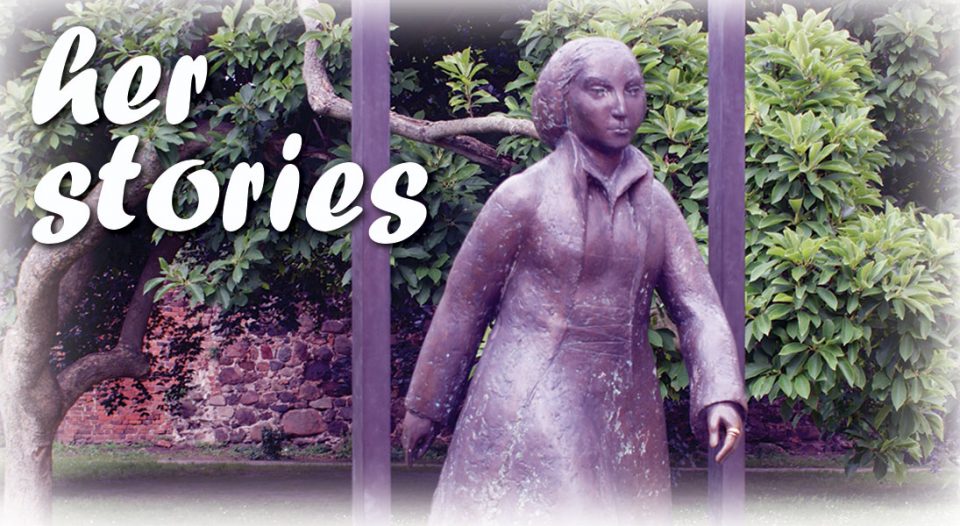Editor’s note: This story is a part of The Lutheran World Federation’s Her-stories global Lutheran storytelling project. If you have a story of how women have reformed the church or influenced your spiritual life, email it to justiceforwomen@elca.org with “Her-stories” in the subject line. Written stories can be up to 1,300 words. Audio/video can be up to five minutes. To learn more about Her-stories and submission guidelines, please click here.
At its very basic level, being a parish pastor is about a relationship of trust, honesty and grace. It has been my task, and my joy, to be an instrument of God’s love, mercy and presence in my life and the lives of others around me.
My first call was to a congregation in a racially changing community. I first met Dorthea shortly after accepting the call as the associate pastor of her congregation. She was a homebound, white woman in her mid-70s with failing health. She had had no experience at all with a woman pastor or with a black person in a leadership position in her congregation.
Dorthea called once to speak with my co-worker who was unavailable. The congregation’s secretary asked if she would like to speak with me, but Dorthea became flustered and mumbled something about not thinking women should be pastors and hung up! Several months later, when my co-worker was on sabbatical, Dorthea again called the church, hoping the pastor might visit, pray with her and give her communion. She hadn’t remembered that the male pastor was away; though she really didn’t want me to visit her alone, she wanted communion and hesitantly asked if I would come.
When I arrived, I saw someone who was anxious and fearful about her health. We spoke of her fears, about her family, about her faith. And we prayed. We sang her favorite hymn, “Beautiful Savior,” and I shared with her that it was my mother’s favorite hymn, too. I thought it was a good visit, considering that she was uncomfortable with me being her pastor. I departed, telling her that my co-worker would be back for her next regularly scheduled visit. A few weeks later, just before the senior pastor was to go to her home, she called the church and spoke with our secretary. She told her the senior pastor didn’t need to come. She would like the woman pastor to visit.
Over the next year, I visited, prayed with her, and asked her to pray for me. Gradually, she lost awareness of immediate events and, sometimes, didn’t respond when she was spoken to. We had talked about how fearful she was of forgetting her family members and of forgetting how much she was loved by God. We would sing “Beautiful Savior” and other favorite hymns and read the Bible together. On one of my last visits to her before she died, I read Psalm 23 and prayed the Lord’s Prayer. Even though I wasn’t sure she knew I was there, there was something about the words or the rhythm of the words that connected with her. She was aware of the Spirit’s presence: she said the psalm and the prayer along with me. Her faith was always important to her. Psalm 23 and the Lord’s Prayer she prayed from her heart.
Thomas was a man in his late 40s who had lived a hard life. When he came to the congregation, he had only been sober and substance free a little more than a year. He faithfully attended Alcoholics Anonymous and Narcotics Anonymous meetings and began to be involved in the life of the congregation. He soon brought his two daughters and their mother to church. Together they became part of the fabric of our congregation. When Thomas celebrated the next anniversary of his sobriety, I was invited to the meeting and the party.
Months after the anniversary of his sobriety, Thomas was under lots of pressure. He had lost his job; one of his daughters needed special assistance in school; he was worried about losing his apartment. There was an incident when the 7-year-old daughter was whining, and he was so frustrated that he jerked her into the car. He was reported to the police and arrested for having abused his daughter.
Several people from the congregation accompanied me to Thomas’ hearing at the district courthouse. We simply wanted to be there to support this man we knew. I did not know our presence would be acknowledged or that I would be called upon as a character witness. I shared that the information reported at the hearing, about previous arrests and the revelations about Thomas’ life before working the 12 Step Program, was shocking to me. The man I knew, the person who was always in church (or if he was going to be away would let me know), was a different person from the one who drank, used illegal substances, acted irresponsibly, and had done horrible things. I said the man I knew gave thanks every day; his old life was in the past; he was in the church. And he was determined that his old life would not be the thing he would be remembered for. Thankfully, his case was dismissed, and Thomas was released.
Six months later, Thomas was in a construction accident at work. A pipe he was fitting into a ceiling fell and hit him in his head. He never regained consciousness. At his funeral, it was my task to help the congregation see that Thomas had been the winner. His old life had not dragged him down. He knew he was God’s son and that he was loved by his family, his congregation, and, most of all, by God. We were all able to celebrate the new life he had and the life he had so eagerly shared with us.
Dorthea was a gift to me, a new pastor. She taught me that faith is planted deep within and that the desire to be close to God transcends prejudice and fear. Thomas taught me that interpreting God’s work in our lives is an awareness of being made new. They both showed me that it was all about the need to be assured that God is present with us. And I learned from them that it was about how God was going to use me, to be a conduit for grace, mercy, compassion and love.
I am retired now after more than 31 years of ordained ministry. Throughout the years of ministry, I have learned to use the gifts I was given and to interpret for others how God is at work in our lives even when life is precarious.
The church has been very good to me. I’ve served congregations in the inner-city, the suburbs, predominately white, predominately black, and culturally diverse. I have been honored to have had the trust of the men and women of those congregations whom I have served with affection and humbleness. I give thanks for the Dortheas and the Thomases who reminded me that ministry is about the God who causes my lips to move and my heart to sing, who ensures that it is God’s love that wins even when we are unaware of God’s movement and presence in us and in life around us.





